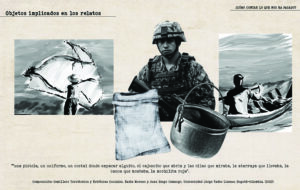How do we tell what has happened to us?

In his work Voices from Chernobyl (2015), in the chapter ‘Monologue on Why People Remember’, the Belarusian writer Svetlana Alexievich presents us with the testimony of the psychologist Piotr S., who asks, why do people remember? “Is it to restore truth? Justice? To free themselves and forget? Because they realise they have been part of a great event? Or because they seek some form of protection in the past?” This is the account of an ‘ordinary’ man, reflecting on one of the human tragedies that, beyond the intention to quantify it through the force of its death toll, impacts as profoundly as the Holocaust, the repression and disappearance of people during the civil-military dictatorship in Argentina, or the more than nine million people recognised as victims of the social and armed conflict in Colombia.
